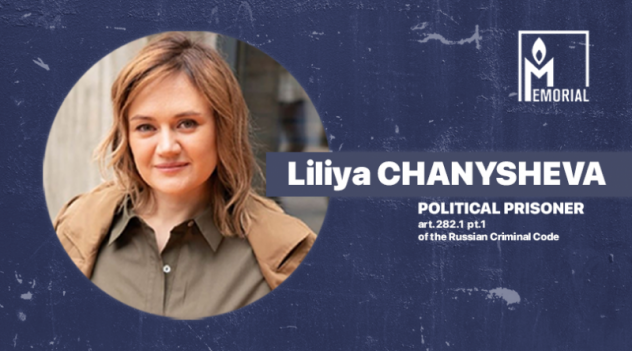Ufa opposition activist Liliya Chanysheva is a political prisoner
Along with Navalny and his associates, Chanysheva is charged with creating an ‘extremist group.’ We believe their prosecution is intended to completely destroy the extra-parliamentary opposition in Russia
Memorial Human Rights Centre, in accordance with international criteria, considers Liliya Chanysheva a political prisoner. Her prosecution is part of a repressive campaign aimed at the total destruction of extra-parliamentary opposition in Russia and pushing Aleksei Navalny's supporters to leave the country.
We demand the immediate release of Liliya Chanysheva and other individuals prosecuted in the case, including Aleksei Navalny and Pavel Zelensky. We call for those responsible for the unlawful prosecution of opposition activists to be held to account and for an end to the criminal prosecution of activists charged in this case who have been forced to leave Russia.
- What are the charges against Liliya Chanysheva?
After another series of searches of the homes of Aleksei Navalny's associates on 9 November 2021, it became known that Ufa opposition activist Liliya Chanysheva had been detained.
Before the organisations affiliated to Navalny were designated as extremist, Chanysheva was the head of the local Navalny headquarters. After these headquarters were disbanded, she withdrew from politics, but decided to stay in Russia.
On 10 November Liliya Chanysheva, despite the fact that she was possibly pregnant, was remanded in custody. The formal ground for imposing such a severe pre-trial measure was a report by an officer of the anti-extremism police department that the activist allegedly intended to leave Russia and continue abroad her participation in the activities of the Anti-Corruption Foundation and Navalny headquarters, organisations banned in Russia.
A few days later, Chanysheva was transferred to Moscow remand centre No. 6.
The activist has been charged with taking part in the creation of an extremist group (Article 282.1, Part 1, of the Russian Criminal Code) solely in connection with the lawful political activity in which she was engaged before Navalny's organisations were banned. Therefore Chanysheva became the first person charged exclusively for the creation of an extremist group.
- Why does Memorial consider the prosecution of Chanysheva politically motivated and unlawful?
We believe the new criminal prosecutions of the leaders of Navalny's organisations, which have been designated as extremist and banned in Russia, are intended to serve the purposes of official propaganda and to obstruct the legitimate political and public activity of Aleksei Navalny and his associates.
The claim that Navalny's organisations were not created for their stated purpose of investigating corruption in Russian government bodies and other forms of public activity, but were allegedly part of some ‘extremist group,’ is absurd regardless whatever scholastic or casuistic justifications the Investigative Committee puts forward to support its position.
After the Anti-Corruption Foundation, the Civil Rights Foundation and Navalny's headquarters were designated as extremist organisations in June 2021, Memorial condemned this decision, noting that ‘neither in the case materials that are publicly available nor in the actions of these organisations is there anything to indicate that their activities are “extremist” in nature.’
This makes the decision to launch criminal proceedings against Aleksei Navalny and his supporters on charges of creating an extremist group all the more unlawful in our view. Over the years, the activities of Navalny's organisations have been repeatedly investigated by the Ministry of Justice and, according to its reports, were not extremist in nature.
We note that a peculiarity in the application of Article 282.1 of the Russian Criminal Code is that ‘leaders’ and ‘participants’ of the ‘extremist group’ only learn that it is considered such when they are formally charged. This also applies to Liliya Chanysheva, who ceased to be actively engaged in politics after Navalny's organisations were banned, but nevertheless has been remanded in custody because she had previously been a leader of a legal civil society organisation.
Recognition of Liliya Chanysheva as a political prisoner automatically follows from our assessment of this criminal case, just as does recognition of any other of Navalny’s supporters prosecuted for taking part in an extremist group or organisation.
The slight delay in the publication of Memorial's statement recognising Liliya Chanysheva as a political prisoner has not been a result of the ‘arguments’ put forward by the Investigative Committee, but is because of the prosecutors’ attempt to unlawfully close down our own organisation.
More information about this case and the position of Memorial Human Rights Centre is available on our website.
Recognition of an individual as a political prisoner or as a victim of politically motivated prosecution does not imply Memorial Human Rights Centre agrees with, or approves of, their views, statements, or actions.
- How to help
Letters can be sent to: Liliya Airatovna Chanysheva (born 1982), 92, Shosseinaya Street, Pre-Trial Detention Centre No. 6, Federal Penitentiary Service for Moscow, Moscow, 109383 [109383, г. Москва, ул. Шоссейная, д. 92, ФКУ СИЗО-6 УФСИН России по городу Москве, Чанышевой Лилии Айратовне 1982 г. р.]
Electronic letters can be sent via FSIN-Letter for a fee, or for free via Rosuznik.
You can support all political prisoners by donating to the Fund to Support Political Prisoners of the Union of Solidarity with Political Prisoners via PayPal, using the e-wallet at [email protected].



